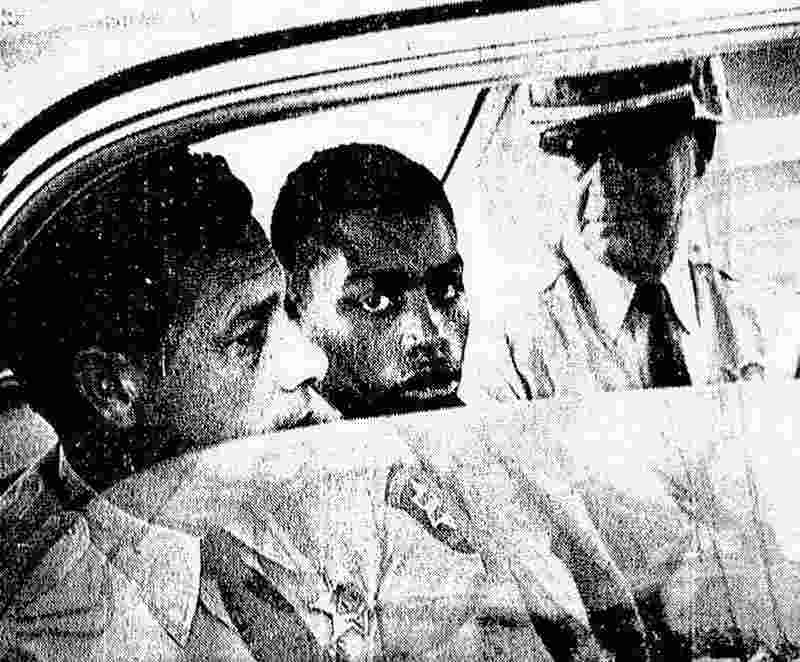
In this February 1964 photo, Henry Montgomery, flanked by two deputies, awaits the verdict in his trial for the murder of Deputy Sheriff Charles H. Hurt in Louisiana.
November 18, 2021
NEW ORLEANS (AP) — A Louisiana parole board granted parole on Wednesday to Henry Montgomery, whose Supreme Court case was instrumental in extending the possibility of freedom to hundreds of people sentenced to life in prison without the opportunity for parole when they were juveniles.
Montgomery, 75, was convicted in the 1963 killing of East Baton Rouge sheriff’s deputy Charles Hurt, who caught him skipping school. Montgomery was 17 at the time. He was initially sentenced to death but the state’s Supreme Court threw out his conviction in 1966, saying he didn’t get a fair trial. The case was retried, Montgomery convicted again but this time sentenced to life in prison without the possibility of parole. He served decades at the Louisiana State Penitentiary at Angola.
A three-member board voted unanimously in favor of parole. Due to the coronavirus pandemic, the meeting was held on Zoom with Montgomery appearing on camera at the Louisiana State Penitentiary at Angola where he has spent his entire adult life.
“He’s been in prison for 57 years. He has an excellent … disciplinary record. He is a low risk by our assessment. He’s got good comments from the warden. He has a very good prison record,” said board member Tony Marabella as he voted to approve Montgomery’s release with certain conditions including a curfew and that he have no contact with the victim’s family.
Montgomery’s release owes back to two specific Supreme Court cases. In 2012, the Supreme Court ruled in Miller v. Alabama that mandatory sentencing of life without parole for juvenile offenders was “cruel and unusual” punishment. But it didn’t settle the question of whether that decision applied retroactively or only to cases going forward.
In 2016, the Supreme Court settled the matter when it took up Montgomery’s case and extended their decision on such sentences to people already in prison.
The decision ushered in a wave of new sentences and the release of inmates from Michigan to Pennsylvania, Arkansas and beyond. But, until Wednesday, Montgomery remained in prison.
After the Supreme Court decision, he was resentenced in 2017 to life with parole and the state judge who resentenced Montgomery called him a “model prisoner” who appears to be rehabilitated. But then the parole board rejected his application two times, the most recent rejection coming in 2019.
Montgomery will be released into the care of the Louisiana Parole Project. The nonprofit was created in 2016 by Andrew Hundley, a former juvenile lifer, to assist people who have served long prison sentences — generally 20 years or more — reenter society. The organization helps former inmates with housing, signing up for health care or medications, getting an ID card and learning how to navigate society.
Hundley spoke during the hearing, with a number of the former juveniles lifers who have gone through his program sitting in a room behind him. When the unanimous decision was announced they could be seen clapping at the news.
During the hearing Hundley and others spoke of what Montgomery had accomplished in prison including his years of work at the prison’s silk screen shop and the length of his stay.
“There is nothing left for him to accomplish at the Louisiana State Penitentiary,” Hundley said. “It is time for Henry to come home.”
His release was not without opposition. Hurt, the sheriff’s deputy who Montgomery killed, was married and had three children. Two of his daughters have met with Montgomery in prison and forgiven him, but family members have opposed his release. A prosecutor from the area where Montgomery’s crime occurred spoke against his parole as did one of the deputy’s daughters, Linda Hurt Woods.
“I do not believe that he should be released at this time,” said Woods, saying that the decision shows deep disrespect to law enforcement officers. “He made a decision at 17 years old. You know right from wrong at 17. I did.”
Montgomery himself said little during the roughly half-hour hearing. According to his lawyer Keith Nordyke, he is extremely hard of hearing, and Nordyke often had to repeat questions from the board members. At times Montgomery said he was struggling to find words to express himself.
“I’m really sorry that I, that this happened,” Montgomery said. “I am going to have to live with this all my life, the rest of my life.”
Since the court’s Montgomery decision, about 800 people who had been sentenced to life without parole as juveniles have been released, according to the Campaign for the Fair Sentencing of Youth.
“The decision to grant Mr. Montgomery parole today is long overdue,” said Jody Kent Lavy, the organization’s co-executive director in a statement. “It’s a grave injustice that he has served over 57 years in prison for a crime he committed as a teenager, despite evidence he was rehabilitated long ago.”
Top Articles in News Services
-

Survey Shows False Election Info Perceived as True
-

Hong Kong Ex-Publisher Jimmy Lai’s Sentence Raises International Outcry as China Defends It
-

Japan’s Nikkei Stock Average Touches 58,000 as Yen, Jgbs Rally on Election Fallout (UPDATE 1)
-

Japan’s Nikkei Stock Average Falls as US-Iran Tensions Unsettle Investors (UPDATE 1)
-

Trump Names Former Federal Reserve Governor Warsh as the Next Fed Chair, Replacing Powell
JN ACCESS RANKING
-

Producer Behind Pop Group XG Arrested for Cocaine Possession
-

Japan PM Takaichi’s Cabinet Resigns en Masse
-

Man Infected with Measles Reportedly Dined at Restaurant in Tokyo Station
-

Israeli Ambassador to Japan Speaks about Japan’s Role in the Reconstruction of Gaza
-

Videos Plagiarized, Reposted with False Subtitles Claiming ‘Ryukyu Belongs to China’; Anti-China False Information Also Posted in Japan






















